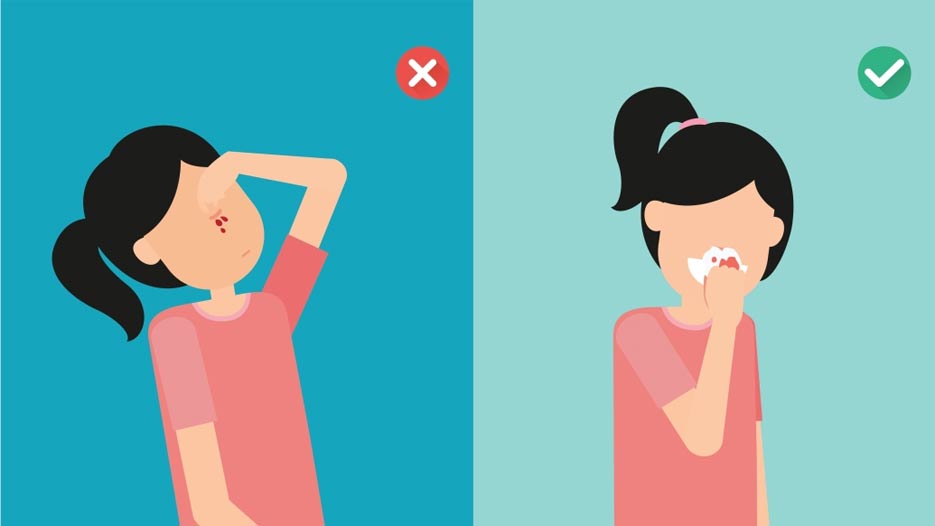What is the disease of spontaneous nosebleed?
When you have a nosebleed for no apparent reason, the cause may be related to medication, a medical condition, or simply dry air. Here's what you need to know about nosebleeds .

Nosebleeds are common, and although the initial cause may not be clear, most cases are mild and can be treated at home.
Direct causes of nosebleeds include trauma to the nose from a blow, an internal deformity of the nose, rhinitis, or, in rare cases, a tumor in the nose. Any of these conditions can cause the internal surface blood vessels to bleed.
Types of nosebleeds
There are two types of nosebleeds: one that starts in the front of the nose, called an anterior nosebleed, and two that start in the back of the nose, or a posterior nosebleed.
Anterior nosebleeds are common and usually not dangerous. They can usually be treated at home. The most common place for an anterior nosebleed to start is the nasal septum, or the part of your nose that separates your two nostrils. The nasal septum contains many blood vessels that can be broken by a simple scratch or a blow to the face.
In contrast, posterior nosebleeds are much less common. These start deeper in the nose when the nasal cavity is injured and bleeds. Posterior nosebleeds can be dangerous; for example, if blood leaks into your throat. Injuries to the nose and high blood pressure are the most common causes of posterior nosebleeds.
Causes of nosebleeds
underlying disease
Liver disease, kidney disease, chronic alcohol use, or another underlying health condition can reduce your blood's ability to clot and thus cause your nose to bleed.
Heart conditions like hypertension (high blood pressure) and congestive heart failure can also cause nosebleeds, as can hypertensive crisis — a sudden, rapid increase in blood pressure that can be accompanied by a severe headache, shortness of breath, and anxiety, according to the American Heart Association (AHA).
Colds, allergies, and frequent nose blowing can also irritate the lining of the nose, leading to nosebleeds.
Dry air
Dry air from indoor heating systems or cold outdoor air can dry out the lining of your nose, causing it to crack and bleed. Using a humidifier while you sleep can help relieve dryness, and saline gel can help moisten your nostrils. Staying hydrated is also important.
Foreign object
Nosebleeds can also occur if a foreign object is lodged in the nose. This is most common in young children, who explore the world by putting objects in their mouths, noses, or ears. Examples of these objects include small toys, pebbles, food, erasers, and dirt.
Blood thinners
Because blood clotting is necessary to prevent or stop nosebleeds, any medication that alters the blood's ability to clot can cause nosebleeds — or make them harder to stop. Examples include anticoagulants such as warfarin (Coumadin, Jantoven), the antiplatelet drug clopidogrel (Plavix), over-the-counter medications such as aspirin, and prescription or over-the-counter NSAIDs such as naproxen.
Many people with atrial fibrillation (afib), an irregular heartbeat, take anticoagulants to prevent blood clots from forming. And if you've had a heart attack, your doctor may recommend that you take a daily aspirin to help prevent another one. Blood clots can lead to a stroke or heart attack if they travel through the bloodstream and reach the brain or heart, but the anticoagulants commonly used to prevent blood clots carry a higher risk of bleeding.
Stuffy or scratchy nose
Accidental damage to the blood vessels in the nostrils from nose picking can cause nosebleeds. This is common in children, but it can also occur in adults who are prone to itching or scratching the inside of their nose.

How to stop nosebleed at home
- While sitting and leaning forward, apply direct pressure to stop the bleeding by pinching your nostrils shut for at least 10 minutes, according to the Mayo Clinic, breathing through your mouth.
- Additionally, one study found that a nasal plug made from a tongue depressor and duct tape may be effective.
- If the bleeding continues, use a nasal decongestant spray (such as Afrin, Dristan, or Vicks Sinex) to constrict the blood vessels in your nose and apply direct pressure again to stop the bleeding. You can also spray the nasal decongestant spray onto a cotton ball or tissue, insert it into your nostril, and hold it there until the bleeding stops.
To prevent further nosebleeds, use saline drops and topical ointments to moisturize the inside of your nose, but only after the bleeding has stopped. And avoid picking or scratching your nose.
While most nosebleeds can be treated at home, some are serious and require medical attention, such as if you are taking blood thinners like aspirin or warfarin, nosebleeds can be quite alarming and should be seen by a doctor. Nosebleeds more than once a week are also a sign that you should talk to your doctor or an ear, nose, and throat specialist. Additionally, you should definitely seek medical attention at the emergency room if your nosebleed lasts longer than a few minutes or if you cannot stop the bleeding with direct pressure.